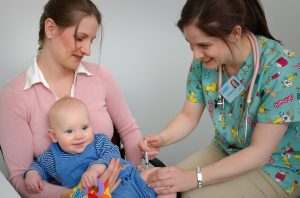2024-04-19 / News

Despite being widely recommended, immunisation of preterm infants is frequently delayed, exposing this vulnerable group to various preventable diseases. The review article “An update on vaccination in preterm infants” by Lillian de Santos Rodrigues Sadeck and Renato de Ávila Kfouri delves into recent research on vaccine safety, effectiveness, and immunogenicity in preterm infants, shining a light on the importance of timely vaccination.
Compared to full-term infants, preterm infants face increased susceptibility to morbidity and mortality caused by vaccine-preventable diseases. This heightened vulnerability is primarily linked to their underdeveloped immune system, which has not fully matured yet and is not fully functional. Additionally, the transfer of maternal antibodies through the placenta begins around the 17th to 18th week of gestation, gradually increasing and reaching peak levels with greater gestational age at birth. Consequently, antibody levels are lower in preterm infants, leaving them more vulnerable to infections.
Prolonged hospitalisation in the Neonatal Intensive Care Unit (NICU) poses additional risks. Infants are exposed to resistant pathogens and administered broad-spectrum antibiotics or steroids. Additionally, they often experience a lack of breastfeeding and disruption of protective barriers due to invasive medical procedures.
Research indicates that preterm infants frequently encounter delays in their vaccination schedules, particularly those with lower gestational age and birth weight. These delays stem from concerns surrounding their vulnerability and the development of their immune system as well as apprehensions regarding vaccine safety. This highlights a gap in understanding vaccine safety and effectiveness among healthcare providers and parents, often driven by fear of adverse reactions. While preterm infants may exhibit higher rates of post-vaccination fever and cardiorespiratory events compared to full-term infants, these effects are typically temporary and mild, with no lasting clinical impact.
Several studies have indicated that preterm infants generate an adequate immune response, according to their chronological age, as recommended, for instance by the German Standing Committee on Vaccination (“Ständige Impfkommission” in German, abbreviated as STIKO) and by the American Academy of Pediatrics Committee on Infectious Diseases. While their initial antibody responses may be lower than those of full-term infants, when vaccinated according to chronological age, most reach protective antibody concentrations. Provided they are clinically stable and there are no contraindications, preterm infants should receive vaccines according to the schedule recommended for full-term infants and based on their chronological age.
Given that preterm infants tolerate vaccination well and exhibit protective immune responses, studies have shown that preterm infants undergo unjustified delays in their vaccination schedule. To address this, several actions are necessary:
Education initiatives should stress the importance of chronological age, alongside clinical conditions, in commencing the immunisation process.
Paper available at: https://pubmed.ncbi.nlm.nih.gov/36608935/
Full list of authors: Lilian dos Santos Rodrigues Sadeck, Renato de Ávila Kfouri.
DOI: 10.1016
You are currently viewing a placeholder content from Facebook. To access the actual content, click the button below. Please note that doing so will share data with third-party providers.
More InformationYou are currently viewing a placeholder content from Instagram. To access the actual content, click the button below. Please note that doing so will share data with third-party providers.
More InformationYou are currently viewing a placeholder content from X. To access the actual content, click the button below. Please note that doing so will share data with third-party providers.
More Information